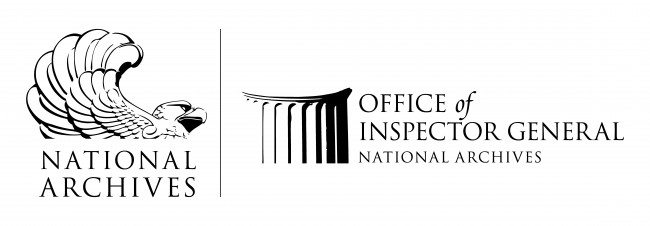
Inspector General Investigates Procurement Fraud
By Michael Davis | National Archives News

The National Archives and Records Administration’s (NARA) Office of Inspector General (OIG) and the Office of Investigations (OI), are investigating multiple allegations of a fraud scheme in which criminals impersonated NARA procurement officials to obtain computer equipment from private vendors.
Since April 2019, individuals claiming to be NARA contracting officers and contracting specialists have been sending fake Request for Quotes (RFQs) for computer equipment using official NARA electronic letterhead to contractors and vendors, referencing previous legitimate NARA solicitation numbers. Additionally, fraudsters spoofed official NARA email addresses with domain names such as “nara-gov.org” and “nara-gov.us.”
“We take all matters of fraud or attempted fraud related to NARA programs and operations seriously, and remain committed to our mission,” said Jason Metrick, NARA Assistant Inspector General for Investigations.
Employees said contractors and vendors received emails that appeared to be from NARA about RFQs that were no longer active. Employees estimated that they received inquiries about the fake RFQs from at least 30 to 40 vendors.
Reviewing relevant records provided by employees and vendors revealed a scheme in which fraudsters identified Federal Government solicitations for computer equipment such as laptops, tablets, hard drives, thumb drives, smart phones, projectors, and printer toner. They then spoofed the official Government email addresses of NARA procurement officials and sent fraudulent RFQs to Government vendors nationwide.
In the email, the “From” header displayed a valid domain, “nara.gov,” making the request look legitimate to the vendors. However, when a vendor replied to the email, the “Reply To” header revealed the non-Government email address. The fraudulent RFQs used the names of legitimate Government procurement officials but included a telephone or fax number associated with the fraudsters. Furthermore, when the fraudsters received quotations from a vendor, they submitted purchase orders with delivery addresses of commercial storage units across the United States.
The OIG reported that during the course of their inquiry, they received additional information from two vendors who had shipped computer equipment as a result of the scheme, but in each instance were able to stop the shipments from reaching the fraudsters. The OIG further reported that attempted losses from those orders totaled nearly $100,000.
The OI reached out to other agency inspectors general and found out that this type of fraud scheme has been active since at least 2016 and has affected multiple Federal agencies. Their investigations, some of which remain ongoing, revealed that individuals (some of them unknowing participants) receive the deliveries at the commercial storage units and are instructed to ship them overseas to be resold by the fraudsters, or the items are resold in the black market in the United States. The vendors never receive payment for the goods.
“We will continue to work with agency officials to ensure that our employees, vendors, and the public are educated about these schemes to help prevent them from becoming victims,” Metrick said. “In addition, as the law enforcement arm for NARA, we will continue to work with other OIGs, law enforcement and the United States Attorney’s Office to identify and prosecute anyone suspected of fraud against NARA.”
The NARA Inspector General posted a fraud alert about this scheme to help raise public awareness.